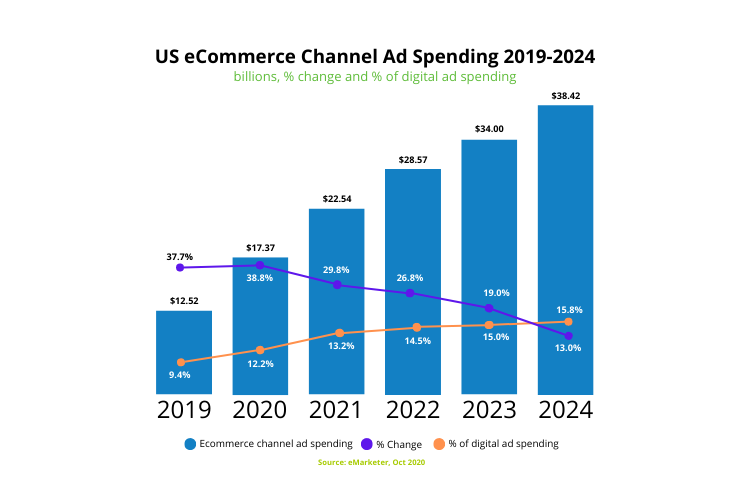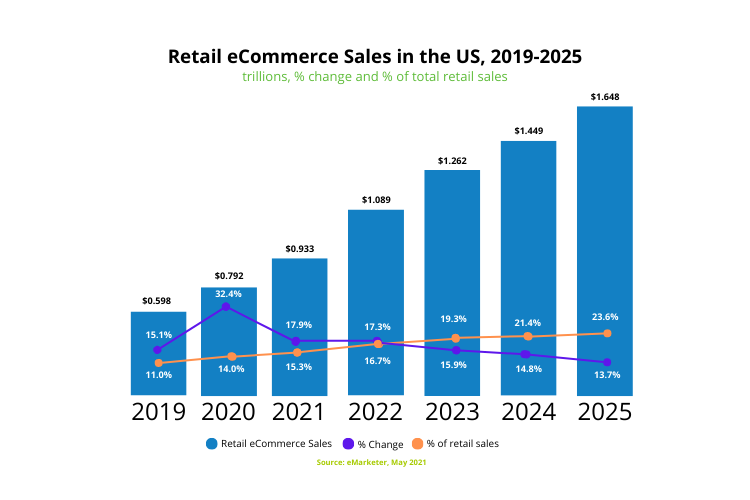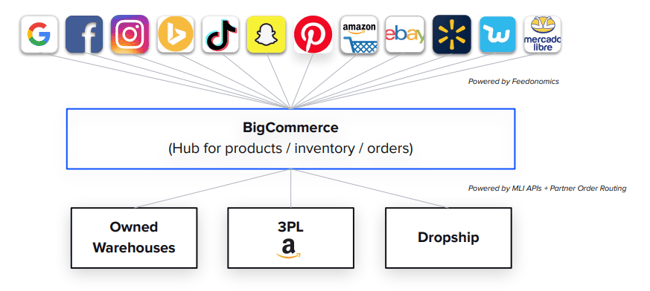- Introduction to Omnichannel
- Benefits of Omnichannel
- Industry Statistics
- Effects of Omnichannel
- Implementing a Strategy
- Getting Help
Introduction to Omnichannel
The term "omnichannel" is not new to the eCommerce industry, but it is becoming more and more relevant. Omnichannel is used to describe an eCommerce strategy that includes multiple sales channels (brick and mortar, mobile, social selling, etc.) that create a seamless interaction of consumers across all sales channels. The goal is for the consumer to be able to view the same inventory, pricing, and promotions across all channels, or provide a unique experience depending on how consumers interact with the brand.
For example, a brand may want to sell through social channels like Instagram and TikTok while maintaining the same access to things like featured products, discounts, and product reviews. Doing so will create a familiar experience throughout all channels if implemented correctly using an omnichannel strategy. Furthermore, businesses that adopt an omnichannel approach often do so in order to provide a better customer experience. According to market research completed by BigCommerce in 2022, an omnichannel strategy increases overall customer loyalty and the lifetime value of a customer. Consumers are savvier than ever these days and it's up to the business to adapt to the consumer. Brands are more likely to build loyalty and keep customers coming back if they can provide a consistent, seamless experience across all channels.
Benefits of Omnichannel
One of the best and most overlooked aspects of omnichannel is how it can help brands better understand their customers. Because of how connected an omnichannel strategy is, brands have an innate ability to track their customers' interactions across all channels. Brands can get a more complete picture of who their customers are and what they want. This information can help brands fine-tune and create strategic marketing initiatives, as well as improve overall customer service.
The second benefit of omnichannel is accessibility. How many times have you been at the computer browsing for items and needed to leave your house? Imagine being able to seamlessly go from desktop to mobile and have the same or familiar experience. You could save your shopping cart from desktop to mobile, enabling you to buy from anywhere--all of which increases the brand's accessibility.
The third benefit of omnichannel is building brand loyalty. When omnichannel strategies are implemented, research indicates there is more repeat shopping, and customers are more likely to recommend the brand to family and friends than those who used a single channel.
The fourth benefit of omnichannel is that it can help brands save money. Omnichannel strategies often include updating or upgrading your eCommerce related technology. There are many types of eCommerce related software that are proven to increase productivity, save time, and help you re-allocate human resources away from manual data entry and towards marketing and sales. By introducing things like PIM (Product Information Management) software, an ERP system, or even a modern eCommerce platform can help a brand save money and increase revenue.
Industry Statistics
So, where is the proof? Why should brands believe the hype? Here's why--there has been a tremendous amount of market research done in the last two years alone with the rise of eCommerce. Here are some of the most relevant statistics.
eCommerce Ad Spend (source)
One of the most exciting trends is the fact that eCommerce ad spend is going up at a very high rate. According to eMarketer,
"Ad spending on ecommerce properties will be up 38.8% from 2019—an acceleration of spending growth, thanks to the pandemic. By the end of this year, ecommerce channel advertising will represent 12.2% of US digital ad spend."

This trend is extremely valuable to omnichannel because you can either target your ads through social channels by linking them back to your online store or you can sell direct through the social platform. The management of those sales, ads, and products are all better handled within an omnichannel ready technology solution.
eCommerce Market Penetration (source)
One trend that I think we all recognize is that more and more people are turning to eCommerce. One thing about this that stands out is the fact that eCommerce is growing by double digits each year! According to eMarketer,
"US ecommerce sales are projected to continue to grow by double digits, up 17.9% in 2021 to $933.30 billion. Ecommerce penetration will continue to increase, more than doubling from 2019 to 23.6% in 2025."

This is just another reason to have an omnichannel strategy in place. Because more and more people are turning to eCommerce every year you want your brand to be available to your consumers in the way they want to buy. That's exactly why omnichannel works. Remember omni means "many", so brands should want to provide their customers as many options they can to spend money on their products or services.
Effects of Omnichannel
Below is an example of a complete omnichannel experience using BigCommerce, Feedonomics, and multiple sales channels for buying, shipping and inventory. What this picture paints is how omnichannel works seamlessly to bring a brand's products to life and make the process of managing and maintaining the business easier and more cost effective.

As you can see, when you introduce an omnichannel strategy you increase the reach of your brand and expand the opportunities you have to sell your products or services to more people. According to BigCommerce, brands that introduce three or more channels increase their engagement by 250%!
Implementing a Strategy
So, where to start? How do brands approach omnichannel? The first thing to do is to build a strategy, because omnichannel involves many components of the business. it's important to get buy in from everyone involved. Every department from sales, marketing, warehousing and even accounting many play a role in the shift to an omnichannel strategy. Don't fret though, omnichannel at its core will increase productivity, free up time, and reduce errors. What omnichannel does for a brand's customers, it also does internally.
Think about this. How much time is spent managing a warehouse that does not automatically communicate with the online store? How do replenishment invoices get to your vendors when you have high volumes of sales? How does marketing develop new ways to sell through social and then synchronize inventory levels with the online store? It sounds like these are all "time sucks" that could result in unhappy customers and burned out employees. Omnichannel is more than just some fancy software. its a holistic approach to sales, marketing, operations, finance and IT.
Getting Help
Here's where it helps to have an advocate. It's easy to sit here and read a blog about what you should do. It's another thing to actually get started. One of the best things a brand can do is to ask for the help from an expert. Seeking help will not only get you started quicker, but you will have the benefit of an outside set of eyes looking at the business objectively. A partner can help with the evaluation of an omnichannel solutions and uncover things only seen through the experience of implementing these systems. There are a few things that you should follow when selecting a partner to help with your implementation.
- Do they have retail, wholesale, manufacturer, finance and IT experience?
- Are they willing to help build the strategy together with your team?
- Do they understand how to implement the technology?
- Will they provide support after implementation?
These are all reasonable questions to ask anyone when looking at an omnichannel strategy. One of the many things we have learned at Fortuitas is that every implementation is different, and only succeeds when we work together with a brand to create a unique and tailor made omnichannel strategy. If you have any questions about omnichannel or omnichannel strategy, please feel free to contact one of our Omnichannel Experts.



